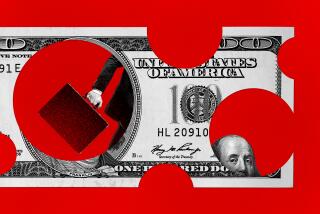Collections Issue Stalls Medicare Revamp
- Share via
WASHINGTON — Congress’ effort to restructure the Medicare program is being stymied by three letters that strike fear into the hearts of politicians and citizens alike: IRS.
President Clinton and the Senate agree on a controversial policy objective: making affluent senior citizens pay more of the cost of their Medicare coverage.
But now comes a surprisingly tricky question: Which government agency should collect the extra payments, which could reach $1,622 next year for the highest-income seniors?
The Senate passed a bill calling for the Health and Human Services Department, which runs Medicare, to collect the special premium.
The White House says this is inefficient. It wants the Internal Revenue Service to gather the money, just as it does the federal income tax.
Support for this plan comes from the nonpartisan Congressional Budget Office. The Health and Human Services Department’s administrative costs would eat up more than half of the $8.2 billion in extra revenue that would be generated next year by the higher premiums, the budget office said.
Republicans in the House of Representatives, however, resist using the IRS to collect any new Medicare premium because they fear the premium would then look too much like a tax.
The dispute reflects the political delicacy of changing a program as massively popular as Medicare, even when many of the major decision makers, particularly in the White House and the Senate, support reform.
The issue now rests with a committee of House and Senate members who are trying to negotiate a compromise version of sweeping budget-cutting bills approved in very different forms by the two chambers. The House-passed Medicare provisions exclude the Senate’s higher premium on well-to-do seniors; instead, they save money by cutting government payments to health care providers.
The House, where members face election every two years and Democrats last year battered every Republican who suggested trimming the rate of growth of Medicare benefits, is squeamish about the whole concept of raising premiums.
House members are reluctant “to walk into perilous political waters,” said Ari Fleisher, spokesman for the House Ways and Means Committee. The higher premiums for the affluent could be a “giant sucker punch” for politicians, he said.
Raising premiums through the IRS, Fleisher warned, could bring a repetition of the disaster of 1988, when Congress embraced a plan to expand Medicare and financed it with a special premium of up to $800 on seniors. The outcry by angry seniors was so strong that the measure to cover long-term care was repealed before it took effect.
The administration, however, argues that using Health and Human Services to collect the new premium is nothing more than a politically appealing front because even under the Senate version, IRS data would be used by HHS to determine how much an individual or couple should pay.
“The point is that the IRS is going to be involved in either one,” said Chris Jennings, the president’s health care policy advisor. “In the Senate plan, the IRS is going to have to share the information with the department.”
Under the Senate-passed plan, the IRS would notify the Health and Human Services Department of the income reported by the elderly on their tax returns. HHS would write to the elderly to ask whether their income had changed. The Social Security Administration would charge seniors according to their responses.
The Clinton administration believes the new process would be too cumbersome and error-prone. “It would require a huge new bureaucracy” with hundreds of employees, a senior White House official said.
Under the administration’s proposal, Medicare beneficiaries would fill out a Medicare premium form enclosed with their tax return and pay a premium based on their income in the past year, according to White House officials.
More to Read
Get the L.A. Times Politics newsletter
Deeply reported insights into legislation, politics and policy from Sacramento, Washington and beyond. In your inbox twice per week.
You may occasionally receive promotional content from the Los Angeles Times.










